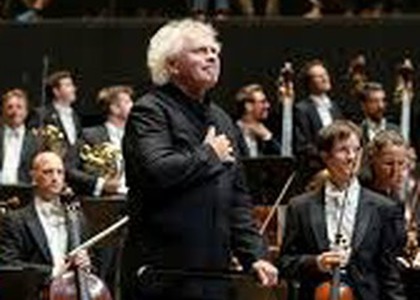> Events

Sir Simon Rattle Conducts Mahler at Munich’s Isarphilharmonie
In 2010, Sir Simon Rattle conducted the Bavarian Radio Choir and Symphony Orchestra of Munich for the first time, performing Robert Schumann's vocal-symphonic masterpiece "Das Paradies und die Peri", that marked the beginning of an outstandingcollaboration, with the British maestro and the German ensemble, delivering remarkable performances year after year. This collaboration eventually led to a contract, making Sir Simon Rattlethe principal conductor of the Bavarian Radio Symphony Orchestra, starting with the 2023-2024 season-an ensemble he has admired for years, whilehe himself is renowned for his "charisma, passion for inovation, commitment to contemporary music, social and educational engagement, and great artistic dedication."
A new concert featuring this distinguished collaboration is scheduled for the evening of November 8th, whenboth the audiences of Munich's Isarphilharmonie and the listeners of our broadcast will have the chance to enjoytwo works - the evening opens with a miniature work for wind instruments and percussion by the British composer Sir Harrison Birtwistle-"Donum Simoni MMXVIII" (2018), a musical gift to the conductor Sir Simon Rattle for his first season with the London Symphony Orchestra, which preformed this piece for the very first time.
Sir Harrison Birtwistle, one of Britain's most original composers who passed away in 2022, is known for large-scale works, including operas and symphonic pieces, often reflecting "contemporary violence." Birtwistle, the"rebellious spirit" of Bristish contemporary music,created complex soundscapes that challenges the audienceand defies categorization; he remains, according to critics, "an enigma" - this miniature will be followed by the monumental Symphony No. 7 by Gustav Mahler, which Sir Simon Rattle presents after conducting Mahler's Sixth and Ninth Symphonies with the Bavarian Radio Symphony Orchestra in Munich.
Known as the "Song of the Night", Mahler's Seventh Symphony is acomplex work of nearly 80 minutes, and features two central "Nachtmusik" movements (the second and fourth), blending elements of nocturnes and serenades, in the final Rondo recalling the motifs from Wagner's "The Mastersingers of Nuremberg" and Offenbach's "Can-Can", andhighlighting the vivid contrast with the first part, that has a gloomy tone. Meanwhile, the Scherzo-admired by Arnold Schoenberg-is considered one of Mahler's most surprising compositions, showcasing his extraordinary skill in orchestratingfor a large ensemble, with richtimbral colors.
Translated by Tania-Ana Lupu,
University of Bucharest, Faculty of Foreign Languages and Literatures, MTTLC, year II
Corrected by Silvia Petrescu














